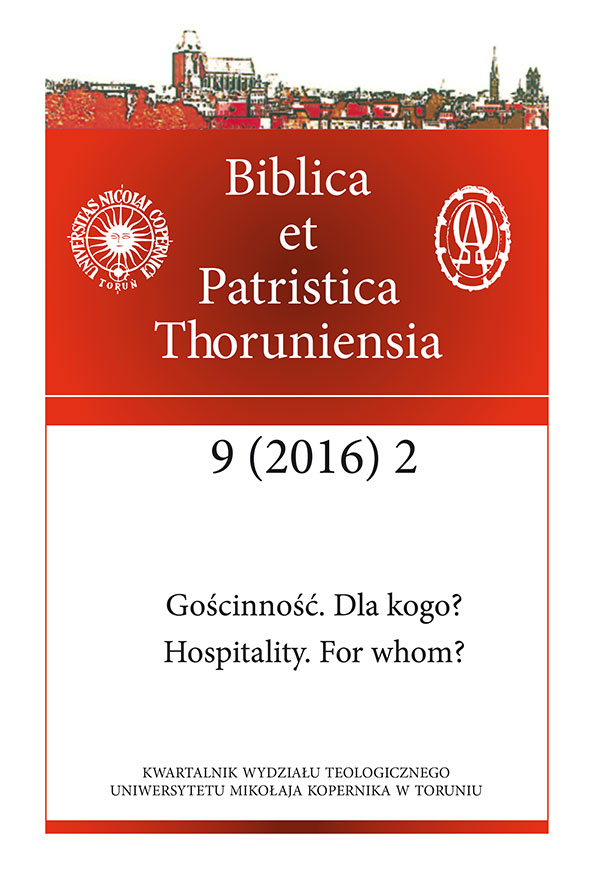Pawłowe rozumienie syneidēsis w Rz 2,9–16
DOI:
https://doi.org/10.12775/BPTh.2016.020Słowa kluczowe
serce, sumienie, syneidēsis, obrzezanie, Prawo, grzech, usprawiedliwienie, Jezus, EwangeliaAbstrakt
Analiza egzegetyczna jednostki 2,9–16 oraz jej kontekstu (sekcji 1,18–4,25) pozwala stwierdzić, że Paweł chce tu nadać greckiemu pojęciu sumienie podobny sens i funkcję jaką pełni serce w tradycji biblijnej i judaistycznej. Wychodzi od wykazania, że wszyscy Żydzi i Grecy zgrzeszyli i dlatego znaleźli się w identycznym położeniu względem sprawiedliwości Bożej, pomimo posiadanego przez jednych Prawa objawionego a przez drugich Prawa naturalnego. Skoro Prawo okazało się nieskuteczne na drodze zbawienia ludzkości to oznacza, że straciło ono skuteczność zbawczą, czego dowodem jest nowa inicjatywa zbawcza Boga zrealizowana w dziele usprawiedliwienia wszystkich za darmo, mocą krwi Jezusa Chrystusa (3,25a). Każdy człowiek może dostąpić tejże łaski przez wyznanie wiary w Chrystusa. Jednak żeby dostąpić daru pokoju oraz uczestnictwa w chwale i czci Boga w wieczności wyznawcy Jezusa muszą konsekwentnie formować swoje serca i sumienia nowym Prawem, to znaczy muszą je obrzezać Ewangelią Chrystusa Syna Bożego, która stała się jedyną mocą Bożą wiodącą ku zbawieniu (1,16). Dowodem zaś na tak odnowiony przez Boga porządek zbawczy jest zapowiedziany sąd nad całą ludzkością w dniu ostatecznym, którego dokona On przez Jezusa Chrystusa na podstawie Ewangelii.
Bibliografia
Aletti J-N., List do Rzymian w: Międzynarodowy Komentarz do Pisma Świętego. Komentarz katolicki i ekumeniczny na XXI wiek, W.R. Farmer (red.), tłum. M. Żurowska, Warszawa 2000, s. 1411–1455.
Barret C.K., The Epistle to the Romans. Black’s New Testament Commentary, London 19912.
Haldane R., Exposition of the Epistle to the Romans, Escondido 1999.
Janowski B., Der Mensch im alten Israel, Zeitschrift für Theologie und Kirche 102 (2005), s. 143–175.
Krawczyk R., „Prawo wpisane w sercach ludzkich“. Studium egzegetyczno-teologiczne (Rz 2,15), Wiadomości Diecezji Siedleckiej 78, nr 2 (2009), s. 102–111.
Paciorek A., Poganie „przed Chrystusem” według Listu do Rzymian 1–2, Tarnowskie Studia Kościelne 13 (1994), s. 207–228.
Sobański R., Treść Prawa wypisana w sercach (Rz 2,15), Palestra 54, nr 1–2 (2009), s. 80–84.
Szymik S., Starotestamentowe, judaistyczne i grecko-rzymskie pojęcie sumienia, Forum Teologiczne XV (2014), s. 7–21.
Pobrania
Opublikowane
Jak cytować
Numer
Dział
Licencja
CC BY ND 4.0. Posiadaczem prawa autorskiego (Licencjodawcą) jest Autor, który na mocy umowy licencyjnej udziela nieodpłatnie prawa do eksploatacji dzieła na polach wskazanych w umowie.
- Licencjodawca udziela Licencjobiorcy licencji niewyłącznej na korzystanie z Utworu/przedmiotu prawa pokrewnego w następujących polach eksploatacji: a) utrwalanie Utworu/przedmiotu prawa pokrewnego; b) reprodukowanie (zwielokrotnienie) Utworu/przedmiotu prawa pokrewnego drukiem i techniką cyfrową (e-book, audiobook); c) wprowadzania do obrotu egzemplarzy zwielokrotnionego Utworu/przedmiotu prawa pokrewnego; d) wprowadzenie Utworu/przedmiotu prawa pokrewnego do pamięci komputera; e) rozpowszechnianie utworu w wersji elektronicznej w formule open access na licencji Creative Commons (CC BY-ND 3.0) poprzez platformę cyfrową Wydawnictwa Naukowego UMK oraz repozytorium UMK.
- Korzystanie przez Licencjobiorcę z utrwalonego Utworu ww. polach nie jest ograniczone czasowo ilościowo i terytorialnie.
- Licencjodawca udziela Licencjobiorcy licencji do Utworu/przedmiotu prawa pokrewnego nieodpłatnie na czas nieokreślony
PEŁEN TEKST UMOWY LICENCYJNEJ >>
Statystyki
Liczba wyświetleń i pobrań: 1121
Liczba cytowań: 0



